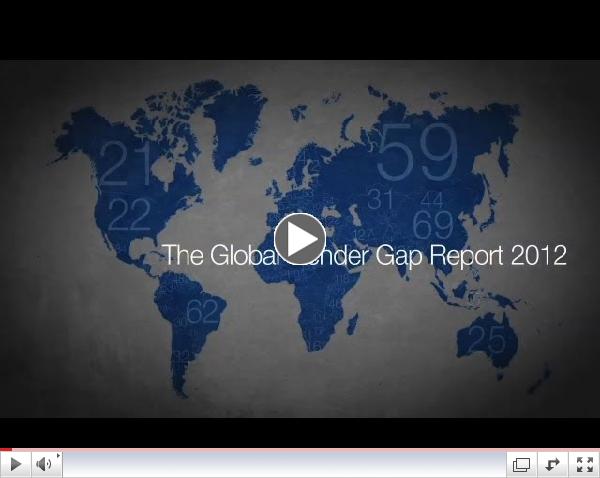Womenable's Top Ten
The most noteworthy news & research of the year For the fourth straight year, we're devoting our end of year e-newsletter to a review of the most noteworthy womenabling events of 2012. Here - in no particular order - is our list of the ten most important research reports, events, and emerging trends of the year:  - Numbers go visual: There's been quite an increase in the use of infographics to share data and research in a visual way. We're proud that our 2012 report on The State of Women-Owned Businesses has been named by PR Week as a finalist in the 'Best Use of Analytics' category. The communications this year included a large social media campaign, including infographics. Here are some of Womenable's favorite infographics, on a Pinterest board.
- Data portals: There's been a great leap forward this year in the aggregation of research information on women's economic empowerment. Most particularly, the World Bank this year launched a Gender Data Portal, which grants widespread access to a plethora of statistics, including the ability to compare countries and regions, as well as to look at trends in a number of measures over time. It's nirvana for womenablers everywhere!
- Data at hand: Speaking of data nirvana, there are now a number of smartphone apps that can place statistical information literally at your fingertips. Check out the US Census Bureau's America's Economy app, the World Bank's Data Finder app, and the visually-appealing Women of the World iPad optimized e-book from Fotopedia and the World Bank. (Another great e-book, which we mentioned in last year's list, is the World Bank's 2012 World Development Report, Gender Equality and Development.)
- Telling stories: Even those of us who are quantitatively focused recognize the value of personalizing research, and using profiles and stories to impart knowledge, stir emotions, and spur action. There's a new player in this space, who's building a fabulous community of womenabling stories, The Story Exchange. Check them out - and also learn more about their 1,000 Stories initiative. Here's one of my favorite stories from their website of high-quality video vignettes:
 | | Paying a Fair Price |
- The "Having It All" myth re-exposed: In late 2010, Facebook's COO Sheryl Sandberg made a splash with a TEDWomen speech during which she essentially told women to "man up" (my paraphrasing) if they wanted to get ahead. The YouTube video of her remarks has gotten nearly 2 million views. (Not as many as Gangnam Style, but pretty high for something related to women's empowerment!) An equally big, if not bigger, splash was made this year by Ann-Marie Slaughter, Princeton professor and former senior official in the U.S. State Department, in a July cover story in the Atlantic magazine, "Why Women Still Can't Have It All," exploring the family pressures that led to her departure from the federal government. It lit up the blogosphere, and certainly showed that, while women have made a lot of progress, it's not been without sacrifice and there are a lot of heated opinions on the many facets of this issue.
- Making headway in high tech?: Speaking of Sheryl Sandberg, the topic of women in tech has a similar "push me-pull you" dialogue going on about how to get more women in STEM fields. Do they just need to toughen up and push ahead, or should existing paradigms be shifted to be more accepting to the differing leadership styles and professional goals of women in the field? Modeling the former modus operandi is new Yahoo CEO Marissa Meyer - who caused a kerfuffle when revealing her pregnancy shortly after taking the helm, but getting right back to business soon after giving birth. Taking a different tack is Harvey Mudd College president Maria Klawe, who has singlehandedly changed the environment - and increased the success - of female engineering and technology students on campus. So, too, new social networks such as Girls Who Code and Girl Geeks chart a different path by creating a collegial environment for women in a still very male-dominated field. It remains to be seen which approach will lead to greater success, but perhaps you can guess which side we come down on!
- Increased focus on access to markets: Last year, we pointed out that an increasing number of corporations are investing in the development of women's business enterprises as suppliers - shifting their emphasis from "corporate social responsibility" to "value chain development." International trade is an important element of market access, and a valuable link in this value chain is the International Trade Centre's Access! initiative for women business owners in Africa, and their Global Platform for Action on Sourcing from Women Vendors - which included a trade exhibition and forum in Mexico City just last month. In addition, the 2nd quarter 2012 issue of their Trade Forum magazine, Empowering Women, Empowering Trade, focused entirely on access to trade issues for women-owned enterprises.
- Gender equality - continued Nordic dominance: For the past seven years, the World Economic Forum has released a Global Gender Gap Report. While some nations rise and fall in this global ranking of gender equality in the areas of health, education, political leadership and economic participation, one region has dominated the rankings since the beginning - the Nordic economies of Iceland, Norway, Finland and Sweden. Read more about the trends and download the current and previous reports at THIS LINK.
 | | The Global Gender Gap Report 2012 |
- Increasing the robustness of indices and lists: While the Global Gender Gap Report remains an important source of data on gender equality, its rankings are based on relatively few variables, none of which include business ownership or self-employment. There are now other players in the game, increasing the robustness of global rankings. First, the OECD has updated and expanded its Social Institutions and Gender Index (SIGI), which evaluates 100 economies on a number of measures that impact gender equality. The variables included in the rankings include existence of domestic violence legislation, women's mobility and discriminatory inheritance practices - highlighting the sometimes hidden ways that inequality is perpetuated. Secondly, the Economist Intelligence Unit, author of the Women's Economic Opportunity Index, is partnering with the Inter-American Development Bank's Multilateral Investment Fund (IDB-MIF) to produce WEVentureScope, an analysis of environmental factors that make it easy - or more difficult - for women to start and grow businesses. This soon-to-come index will finally add women's entrepreneurship into a country ranking equation - at least for Latin America and the Caribbean. Viva!
- Recognizing the contributions of unsung heroines: Most business awards and lists focus on economic impact - who generates the highest revenues, employs the most workers, or has grown the fastest in either or both of those areas over a period of time. The International Alliance for Women has done things a little differently, and we think that's all to the good. For the past five years, their World of Difference Awards have focused on recognizing women entrepreneurs and entrepreneurial enablers who are making a difference to the triple bottom line - largely without fanfare. We need more of this, so we're adding it to our Top Ten list to shine a light on this approach, and perhaps to plant a seed for others to follow!
And, just for good measure, here are links to some other Top Ten lists you might be interested in: Did we miss any critical items? Think we're off the mark on any of the above? Let us know! Curious to compare this list with our previous Top Ten lists? Click on the following links to read our Top Ten womenabling events of 2011, 2010, and 2009. |